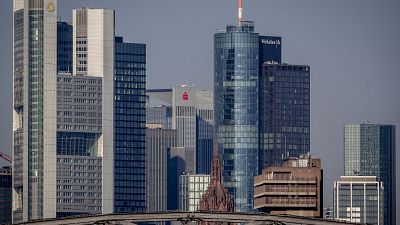The DAX hit record highs, defying Germany's grim economic outlook. Despite a recession risk, SAP's AI-driven growth has significantly boosted the index, contrasting sharply with the decline in major automotive stocks.
The DAX, Germany's leading equity index, recently reached new record highs, defying the growing economic challenges that many economists believe could tip the nation into a technical recession by the end of the current quarter.
This remarkable market performance contrasts sharply with the decline observed among Germany's automotive stocks – BMW AG, Mercedes-Benz AG, Porsche AG, and Volkswagen AG – none of which have posted positive returns so far this year.
While expectations for the European Central Bank to commence a cycle of interest rate cuts, fuelled by declining inflation, have certainly bolstered sentiment across European markets, the DAX has distinctly outperformed its European peers. Indices such as France's CAC 40, Spain's IBEX 35, Italy's FTSE MIB, and the UK's FTSE 100 have all lagged behind thus far this year.
Fossil fuel prices, particularly for natural gas and oil, have eased, which has been a boon for the energy-intensive German economy, providing some cost relief for German companies.
Yet, a determinant factor giving the DAX an edge compared to peers is likely to have stemmed from the extraordinary performance of its leading software and technology company, which is reaping the benefits of the AI-driven growth.
Germany's economic woes persist
The DAX's resilience stands in stark contrast to Germany's increasingly bleak economic outlook.
The nation's GDP contracted by 0.1% in the second quarter of 2024, trailing the eurozone's 0.3% growth during the same period. The manufacturing sector, historically a pillar of the German economy, is mired in a structural recession. The S&P Global Purchasing Managers' Index (PMI) for Germany slid further into contraction in August, hitting a five-month low, extending a downturn that has persisted since mid-2022.
"The recession in Germany's manufacturing sector is dragging on way longer than anyone expected," commented Cyrus de la Rubia, chief economist at Hamburg Commercial Bank.
Traditionally, the sector has rebounded within 20 months of a downturn but, this time, the situation is different, with China's growing competition exacerbating the challenges faced by German manufacturers, particularly in automotive and mechanical engineering.
The ifo Business Climate Index, reflecting sentiments from around 9,000 German businesses across various sectors, fell to 86.6 points in August from 87 in July, marking a new five-month low. "The German economy is increasingly falling into crisis", warned Clemens Fuest, President of the ifo Institute.
"The current renewed disappointment among companies is more difficult to explain and the uncertainty among consumers seems to be lasting longer. Added to this are the numerous structural problems in the German economy", said Ralph Solveen, deputy head of Economic Research, Commerzbank AG.
SAP: The Key Driver of DAX Gains
A critical factor in the DAX's superior performance is the extraordinary growth of SAP, Germany’s leading software and technology company.
SAP has been at the forefront of the AI-driven expansion, with its stock surging by 42% year-to-date through September 3, following a 45% rise in 2023.
More than a third of the DAX's gains this year can be attributed to SAP's performance.
SAP's success is underpinned by its strong cloud revenue growth, which climbed 25% year-on-year to €4.15bn in the second quarter of 2024. The company's overall revenue exceeded analyst expectations by 0.5%, increasing 9.7% year-on-year, while earnings before interest and taxes (EBIT) beat forecasts by 7.4%, rising 35% year-on-year.
"Our cloud growth momentum remained strong in Q2, with Business AI enabling many deals. At the same time, we continue to invest in our transformation to be the leader in Business AI. Given our progress and strong pipeline, we are confident to achieve accelerating topline growth through 2027", said Christian Klein, CEO of SAP.
According to Goldman Sachs analyst Mohammed Moawalla: "SAP is well-positioned to benefit from the upcoming Gen-AI cycle, driven by robust S/4 HANA product momentum. The management is committed to embedding Business AI across its portfolio, with AI now playing a pivotal role in 20% of all deals."
Furthermore, SAP's strategic use of Generative AI is expected to generate significant cost synergies within its workforce, with efficiencies in the triple-digit-million range likely to be realised by fiscal-year 2025.
This approach supports the view that SAP is well-positioned to capitalise on the Gen-AI cycle, which is expected to drive around 25% compound annual growth in cloud revenue between 2024 and 2028.















